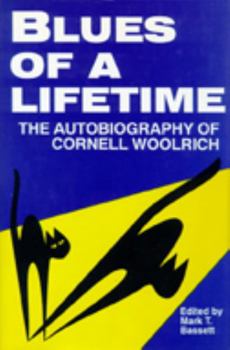Blues of a Lifetime: Autobiography of Cornell Woolrich
Select Format
Select Condition 
Book Overview
Blues of a Lifetime is essential reading for people interested in suspense novelist Cornell Woolrich, author of Rear Window. Woolrich's autobiography includes accounts of his working methods, his... This description may be from another edition of this product.
Format:Paperback
Language:English
ISBN:0879725362
ISBN13:9780879725365
Release Date:October 2011
Publisher:University of Wisconsin Press
Length:168 Pages
Weight:0.57 lbs.
Dimensions:0.4" x 6.0" x 9.0"
Customer Reviews
3 ratings
Peek into the Mind of a Writing Genius
Published by Thriftbooks.com User , 17 years ago
Cornell Woolrich (1903-1968), who wrote the original stories that "Rear Window", "Night Has A Thousand Eyes", and many other movies were based on, stumbled on writing as his life's work while recuperating from jaundice and a liver problem, at age 20. He read every book he could get his hands on during this time, and concluded that anybody could do a better job than those authors -- they "insulted" his intelligence. Even an amateur could do better. HE could do better. With one hand tied behind his back. He then set about the task of writing his first novel --which, to his shock and amazement, sold. In fact, it won a $10,000 prize. He quickly became addicted to writing "entertainment fiction," as he called it -- over 200 short stories, and 27 novels (21 of them made into movies) -- and was regarded by many experts as one of the 4 greatest writers of mystery and suspense who ever lived (the others: Dashiell Hammet, Raymond Chandler, James M. Cain). He wrote obsessively -- totally out of his imagination rather than the real world -- and lived the life of a solitary introvert, in hotel rooms, all his life, mainly in New York City (Manhattan), occasionally in London, Paris, Seattle. A phenomenal number of the things he wrote were adapted for radio and television dramas (notably "Alfred Hitchcock Presents"). Hundreds of his original ideas were stolen and used by others in other formats, without his consent, credit or compensation. His greatest fears -- in fiction and real life -- were loneliness and death. He wrote, perhaps, to live more lives than one, to be (as he put it) "alive a little longer, to be among the living." But he died alone, at the age of 64, of complications from diabetes and alcoholism -- written out, so to speak, having produced little during his last 6 years other than this unfinished manuscript, which he visualized as 6 short stories, 5 of which he completed, with only a few preliminary notes for the last one. It made him sad to think of the past -- mistakes made, opportunities missed, how his life might have been different -- hence the title, Blues of a Lifetime, but he wanted to revisit it one last time, in a private memoir, not meant for publication, to be placed among his private records and manuscripts, which he bequeathed, along with his entire, nearly million-dollar estate to Columbia University, where he had been a student, 1921-6, excelling in only 1 subject -- writing -- and from which he had failed to graduate. Carefully edited by Mark T. Bassett, with fidelity to Woolrich's style, intent and pencilled notations, with many useful and carefully researched chapter notes, Blues of a Lifetime is vital to an understanding of Woolrich's art, a rare glimpse into the mind of a writing genius. It stands out, along with Francis Nevins' massive (613-page)study of Woolrich's entire body of work, "Cornell Woolrich: First You Dream, Then You Die", as the story behind the Woolrich legacy. P.S. -- It's important to note that I am still i
A must for all lovers of Cornell Woolrich
Published by Thriftbooks.com User , 23 years ago
This book really gives you an interesting insight into the mind of Cornell Woolrich. I loved it and recommend it to anyone who wants to know more about him.
Even in his last years, Woolrich could work his magic
Published by Thriftbooks.com User , 26 years ago
This collection of supposed vignettes into Cornell Woolrich's life shows that, even in the last years of his life, he was able to work his word magic.As noted by Francis M. Nevins Jr. in his biography of Woolrich, "First You Dream, Then You Die", Woolrich liked to tell different stories about his early life with little regard to consistency with the known facts or with other stories that he told. There isn't enough known about Woolrich to be able to say with certainty that these stories are or are not true, but it does not matter because they are fascinating nonetheless, and can stand with the best of his stories. Although they cannot, for the most part, be classified as belonging to his chosen field of mystery/suspense, they share many of the elements of his best work: vivid pictures of "everyday life", finding and telling the stories in ordinary situations, and a knack for making you feel for and with the characters.While it is a fairly minor point, I found the introductory essay by Mark Bassett a bit annoying in the way that it contains bibliographical references that are i) in a different format than the actual bibliography; and ii) cannot be matched to any bibliographical entry in many cases. I had the sense that this essay was trimmed down or excerpted from a longer essay (possiby a thesis, given the publisher?), but not carefully editted.In spite of that minor complaint, we should all be thankful to Mark Bassett for bringing these Woolrich tales to print.





